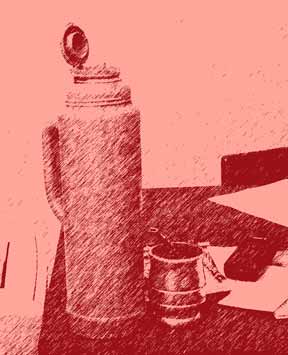translated by: Eric Barenboim
(any improvement or advice on the translation will be appreciated)
On how ideas appear

Ideas present to me in many ways. Sometimes as evidence with which one stumbles upon, just like when we find something we weren’t looking for, the way two lines come with the tunes, or a sentence by Natacha or having an ordinary experience and knowing how a character would react to it.
Some other times it’s a kind of intuition, like when we suspect there’s a solution to something, a feeling somehow vague: a matter, a pose: there is a solution, we’re sure, even though we can’t express it right now.
I don’t think those are experiences reserved only for the artist – any creative act is born that way, and they might be a tale as well as a new dish, or the breakthrough in an engine repair, a physics theory or a biology hypothesis. Suddenly one has access to “first hand data” and arrives to a clue-ish thing.
What comes next is, as always, to elaborate from that clue until we complete it, until we solve it. And it implies a great dose of stone breaking and coherence, similar to the sensation of working out a riddle. It offers part of the solution, but it contains the risk of derail.
The first writing occurs under a “weak state of mind” (and I hate to describe it like that!), I mean that it is similar to being tremendously awake but at the same time letting oneself flow away into reveries. And I copy, type, what comes from there or is handed down. Nothing magical nor cryptic: if you know your grandma really well and you place her in some given situation you won’t feel that you’re making up what she says, but as if you already knew what her reaction would be, and all there’s to do to it is to copy, as if it was being handed down to us. That’s why it is so important to know your characters really well.
I try not to intervene that “floating” state with any kind of correction: I type, type. Yes, there is a soft tutorship: it’s much better if I know the characters well enough and it’s also better if I know where I want them to go or in which situation they’re stuck.Because it can also happen that one writes to find out, but that’s different. So those two points of reference are besides me, without a corrector’s intent, while I write, type.
I try to accomplish a minimum of 1000 words a day, which are usually a bit more, and if I’m in a period of a lot of tiredness I lower the demand to 500. Whatever I write after that: pure earnings, but with the minimum is fine.
Later will come the time when I print and then, yes: I just correct, cross out and underline in the paper. After that I load the corrections and that’s another time which is not automatic, because when loading them into the computer I make some retouching.
I think it is a gift to enjoy the moment of correction (polishing, carving, crafting) as much as the moment of writing itself.
© Luis Pescetti
more on writing, and creativity workshop: click here
© Luis Pescetti
